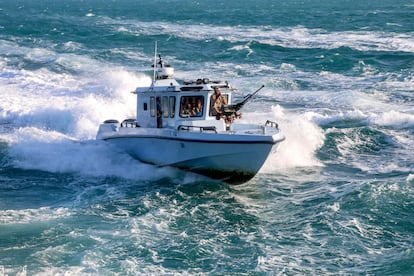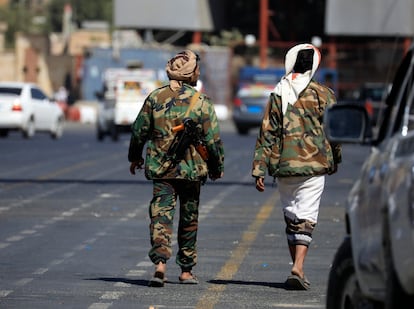Houthi militia’s Red Sea attacks threaten global maritime trade
Since last month, the rebel group has been targeting ships allegedly linked to Israel. The offensive has sparked calls for greater U.S. military deployment as there are fears the conflict could spread to the Strait of Hormuz

The leader of Yemen’s Houthi movement, Abdul-Malik al-Houthi, announced in a speech in mid-November that his forces were prepared to track and attack Israeli-linked merchant ships in the strategic waters of the Red Sea, as part of the group’s response to the Israeli military offensive in Gaza.
Just five days later, members of the rebel group attacked a cargo ship belonging to a company owned by a British-Israeli businessman. It was a striking attack that was recorded on video. In the footage, a helicopter, bearing Yemeni and Palestinian flags, is seen approaching the ship, and letting out heavily armed Houthi rebels. The ship was taken to the port of the Yemeni town of Al Hudaydah, with its 25 crew members as hostages. The ship has now become a tourist attraction for Yemenis, who walk around the deck in groups.
This and other actions — such as Monday’s attack on a Norwegian tanker— have sparked alarm. There is growing concern that these attacks could threaten navigation in the Red Sea, one of the main arteries of global trade. On Tuesday, the Houthis claimed responsibility for a missile attack against the Norwegian cargo ship Strinda, which suffered damage but no injuries and headed to a safe port. The Strinda was heading to Venice with a cargo of vegetable oil.
On December 4, in another display of their capabilities, the Houthis — a militia supported by Iran — launched a new attack in the Red Sea. On this occasion, the target was three freighters, and involved missiles and drones. A U.S. warship in the area was forced to intervene, according to the U.S. Navy’s Central Command (Centcom). The militia claimed responsibility for the attack on two ships that suffered minor damage, which they said were linked to Israel. The rebel group announced that same Sunday that it would attack any ship that appeared to be sailing towards Israel.
A Houthi spokesman explained that his group would attack ships heading to Israeli ports in the area as long as Israel continued to block humanitarian aid from entering Gaza. On Monday, about 100 trucks loaded with food, water, medicine and fuel entered the Gaza Strip. Before the war, that figure was 500.
The Houthi offensive has sparked calls for greater military deployment in the area — the U.S. is discussing possible measures with its partners and allies — and there are growing fears that the attacks could spread to the Strait of Hormuz, which is off the coast of Iran and one of the most important oil arteries in the world.
“This is a worrying situation,” says Jakob Larsen, safety director at the Baltic and International Maritime Council (BIMCO), one of the largest associations representing shipowners. “The Houthis have made it clear that ships [with links to Israel] are their main target, but it seems that one of those attacked last weekend did not have any, so the rest of the shipping industry is quite concerned too,” says the expert.
The Bab al-Mandab Strait, less than 18 miles wide at its narrowest point, connects the Gulf of Aden in the Indian Ocean with the Red Sea, which leads into the Suez Canal, linking with the Mediterranean Sea. Around 12% of all oil traded by sea and around 8% of global trade in liquefied natural gas (LNG) flowed through this busy route in the first half of 2023, according to the U.S. Energy Information Administration. Over 10% of world trade passes through the Suez Canal, according to estimates by the entity that manages it.
The Houthi militia is at war with the internationally recognized government of Yemen, which is supported by Saudi Arabia. The rebel group controls much of northern Yemen, including the capital Sanaa, and almost its entire Red Sea coast. In recent years, the group has become a notable military force in the region, with tens of thousands of soldiers, combat experience, naval capacity and a large weapons arsenal.

“In the past, they used sea mines, guided improvised explosive devices and missiles in the Red Sea. Although these methods were also effective, the latest incidents, and the increase in the use of drones, mark an uptick in the threat in the area, specifically for merchant ships linked to Israel,” says Gabrielle Reid, from the security consultancy S-RM.
Risk management
Houthi leaders have made it clear that their target is merchant ships linked in some way to Israel. But there are signs that suggest that the information they have is outdated. For example, one of the ships attacked last Sunday had been operated by an Israeli shipping company until 2021, but currently the company that owns and manages it is British, as revealed by the maritime security firm Ambrey.
“It is important to understand that when the Houthis say that the threat is aimed at ships with Israeli ties, these ships also have ties to many other countries: they are often crewed by sailors from other nations, and the ship and cargo owners are from completely different countries to Israel,” says Larsen.
Given the threat, an alliance of companies that provide marine liability cover for around 90% of the world’s ocean tonnage has recommended ships in the region exercise “extreme caution,” and seven maritime industry associations published guidance in November on how to deal with these new dangers. The U.S. Department of Transportation also issued an alert for the Red Sea last Monday.
One of the most immediate effects of the attack is an increase in insurance premiums for ships, although Larsen believes that shipowners “will be able to pass on the additional cost to the customer without it being noticed in any significant way.” There is also increased investment in security measures, although BIMCO’s security director believes that ships have little room for maneuver: “A merchant vessel can do some things to protect itself from these threats, but when you are up against an actor with weapons of war at its disposal, it is a bit difficult.”
Some shipowners are considering more drastic measures, such as alternative routes to the Red Sea, but this involves circumnavigating all of Africa through the Cape of Good Hope, a much longer and more expensive route. One of the few companies that has taken this step is the Israeli shipping line Zim, which in mid-November stated that it had diverted some of its ships to guarantee the safety of its crews, ships and cargo.
Military force
After the attacks against three merchant ships on December 4, the U.S. Central Command said that it believed that the actions had been “enabled by Iran,” an ally of the Houthis, and that it would consider “all appropriate responses.” A day later, the Pentagon’s number two, Admiral Christopher Grady, and U.S. national security adviser Jake Sullivan said they were working with partners and allies to define a joint response to the new threat, which could involve a naval escort that provides protection to ships.
Although some actors in the sector have also called for greater military deployment in the region, it’s not guaranteed that such a move would be effective. The Yemeni rebels have attacked ships despite the fact that the U.S. has increased its presence in the Middle East since the beginning of the Israeli offensive in Gaza. The U.S. has sent two aircraft carriers with thousands of troops, as well as warships, to deter Iran-backed groups.
A greater military presence would also increase the risk of escalation in the nearby Strait of Hormuz, which connects the Persian Gulf and the Arabian Sea in the Indian Ocean. Although this area has not seen the same level of attacks as the southern Red Sea, in late November, a cargo ship managed by an Israeli businessman’s company was attacked in the Indian Ocean with a drone containing supposedly Iranian explosives. In recent weeks, the area has been the scene of new tensions between U.S. and Iranian naval forces.
Sign up for our weekly newsletter to get more English-language news coverage from EL PAÍS USA Edition
Tu suscripción se está usando en otro dispositivo
¿Quieres añadir otro usuario a tu suscripción?
Si continúas leyendo en este dispositivo, no se podrá leer en el otro.
FlechaTu suscripción se está usando en otro dispositivo y solo puedes acceder a EL PAÍS desde un dispositivo a la vez.
Si quieres compartir tu cuenta, cambia tu suscripción a la modalidad Premium, así podrás añadir otro usuario. Cada uno accederá con su propia cuenta de email, lo que os permitirá personalizar vuestra experiencia en EL PAÍS.
¿Tienes una suscripción de empresa? Accede aquí para contratar más cuentas.
En el caso de no saber quién está usando tu cuenta, te recomendamos cambiar tu contraseña aquí.
Si decides continuar compartiendo tu cuenta, este mensaje se mostrará en tu dispositivo y en el de la otra persona que está usando tu cuenta de forma indefinida, afectando a tu experiencia de lectura. Puedes consultar aquí los términos y condiciones de la suscripción digital.









































